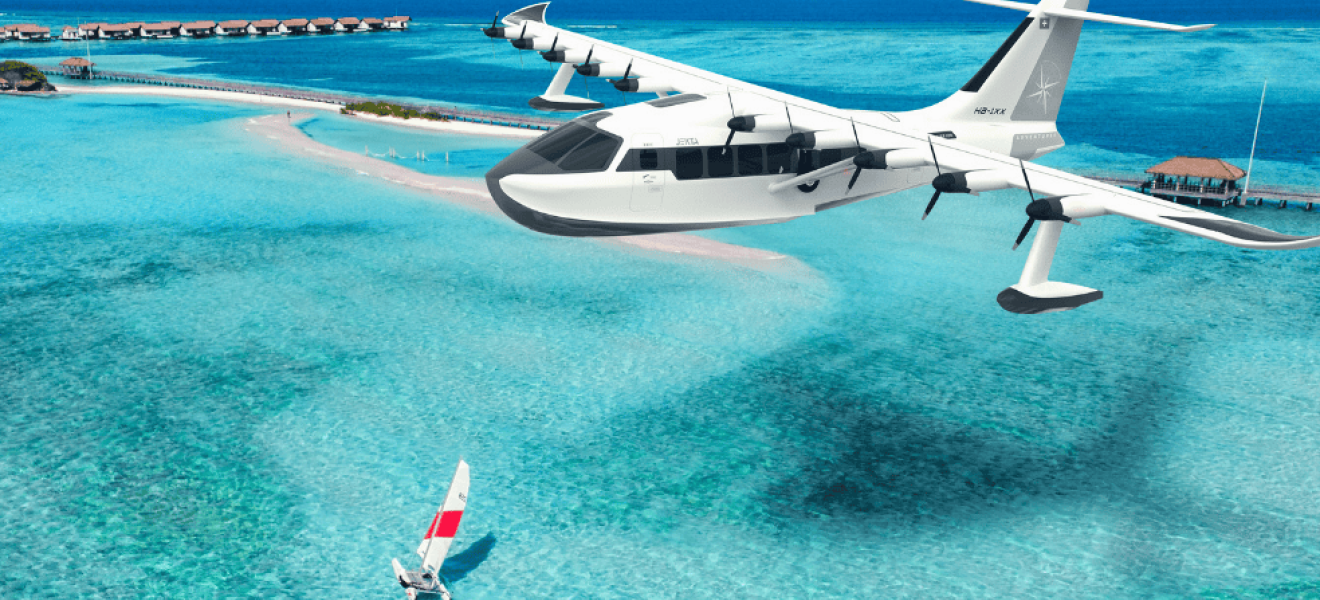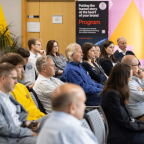
Open Skies Network secures strategic investment from the Great South West
Image credit: JEKTA
Open Skies Network (OSN) - a spinout from the successful Open Skies Cornwall
project - has secured investment from the Great South West’s New Innovators
in Marine and Maritime fund to enable the expansion of its network and
explore options to accelerate the introduction of electric seaplane and cargo
drone capability in the South West.
The investment will build on the recent trailblazing progress made by the
Open Skies team in unmanned cargo adoption in Cornwall, and increase its
water, manned aviation and regional air mobility geographic footprint.
Stage one of the HarbourLift programme will assess the feasibility of
operating zero-emission flights between key harbour cities and towns in
Dorset, Somerset, Devon, Cornwall and the Isles of Scilly, enabling greater
coastal connectivity through the use of sustainable, short-hop air mobility.
Gareth Whatmore, CEO of Open Skies Network, said: “The programme launch
comes at a critical time for coastal communities that often face limited
transport options, long journey times, and seasonal congestion.
“By validating how clean aviation technology could work in practice, the
Open Skies Network HarbourLift programme aims to demonstrate how short-hop
seaplane services could provide a faster, greener, and more sustainable
alternative for regional connectivity and establish further port,
manufacturer and operator partnerships to implement network expansion and
allow for service adoption.”
A Blueprint for Coastal Air Mobility
Under the HarbourLift programme Open Skies Network will work with local
ports, harbours, aircraft manfacturers and operators to examine the full
range of factors required to introduce electric seaplanes to the region,
including:
* Aircraft performance and energy requirements
* Docking and charging infrastructure needs
* Suitability of harbours and maritime environments
* Integration with ferries, rail, buses, and conventional regional aviation
The programme will also look beyond passenger travel, exploring how seaplanes
could support existing Open Skies Network partners, such as medical logistics
(NHS), emergency response (Maritime Coastguard Agency), and sustainable
parcel delivery (Royal Mail), across the South West’s dispersed coastal and
island communities.
“Decarbonised aviation is moving from concept to reality, and the South
West is perfectly placed to establish an Open Skies Network that supports a
new wave of aviation services,” continued Gareth. “The HarbourLift
programme will build the evidence we need to understand how these aircraft
can serve real community needs, while reducing emissions and supporting
regional economies.”
Community-Led Innovation
A defining feature of the Open Skies Network approach is its commitment to
engagement with residents, businesses, and harbour users. From fishermen and
ferry operators to tourism providers and local councils, community input will
be central to shaping how electric seaplanes might be deployed.
Louis Gardner, programme manager for HarbourLift, said: “Transport
innovation only works if it reflects the voices of those who use it. That is
why HarbourLift is as much about consultation as it is about technology. We
want to ensure cleaner air travel is developed in a way that truly benefits
coastal towns and that our ports and harbours are Aviation Ready. We will be
touring the local area to share more about our plans in due course and look
forward to engaging with interested parties across the region to inform
programme development.”
A Greener, Faster Alternative
Electric seaplanes and new generation zero-emission amphibian aircraft
combine several advantages over alternative transport methods, including low
noise, zero direct emissions, and short-haul efficiency, with dual use
capabilities across water and land. For communities separated by challenging
road or ferry journeys, they have real potential to dramatically cut travel
times.
Wouter du Preez, Chief Investment Officer at JEKTA Switzerland, which is
developing a new generation of zero-emissions amphibious aircraft, said:
“Sustainably powered amphibian aircraft with multi-purpose operating
capabilities across water and land open up a new era of affordable,
sustainable air mobility that has the potential to add real value to local
communities - especially those in traditionally remote geographies. The
HarbourLift programme provides a fantastic opportunity to work closely with
local communities, infrastructure providers and service operators within the
Open Skies Network to test and evaluate integration opportunities; informing
ultimate service design to meet the needs of businesses, civil services, and
residents alike.”
The programme will run through 2025-2026 with final recommendations published
at the end of the study. The findings of the study will then be used to
inform the second phase of the programme.







